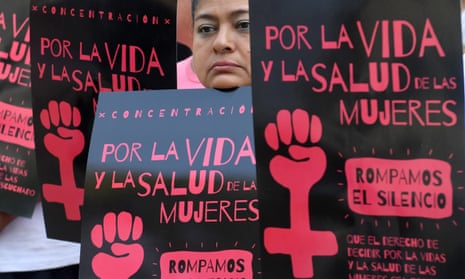A teenage rape victim in El Salvador has been sentenced to 30 years in prison for murder after having a stillbirth, the latest in a long line of failures of justice against pregnant women in the Central American country.
Evelyn Beatriz Hernandez Cruz, 19, from a small rural community in Cuscatlán, eastern El Salvador, was convicted on the grounds that failing to seek antenatal care amounted to murder.
Hernandez, a high school student, gave birth into the toilet in April 2016 after falling ill with acute back and stomach pain.
Hernandez, who at the time was 18, was in her third trimester, but hadn’t realised that she was pregnant. She had been repeatedly raped by a gang member over several months as part of a forced sexual relationship.
Medical experts were unable to ascertain whether the foetus died in utero or in the moments after delivery.
The female judge accepted the prosecutor’s claims that Hernandez failed to seek antenatal care because she did not want the baby, and threw him into the toilet intending to kill him.
In sentencing, the judge went further and suggested that Hernandez could not have acted alone and that her mother may also be criminally responsible.
According to Morena Herrera, executive director of the Citizens’ Group for the Decriminalisation of Abortion, the verdict was based on prejudices held by the prosecutor and judge.
“The judgment sentencing Evelyn to 30 years in prison shows how in El Salvador justice is applied without direct proof, without sufficient evidence that clarifies what a woman has done,” Herrera said.
El Salvador – one of five countries where abortion is illegal in all circumstances – has imprisoned dozens of mainly poor young women for murder after they suffered obstetric complications.
Abortion was criminalised in El Salvador 20 years ago, after legislators from across the political spectrum voted to strip women of their reproductive rights without any public debate or medical consultation about the consequences. The 1997 reform was passed after a shadowy campaign by a small group of powerful anti-choice groups linked to the Catholic church.
Hopes had been raised that the ban would be relaxed amid a groundswell of public and medical support for a parliamentary bill proposing to allow abortion in cases of rape or human trafficking; when the foetus is unviable; or to protect the pregnant woman’s health or life.
But four months after the parliamentary hearings ended, the bill remains in the hands of the legislative committee. The nine cross-party deputies have yet to decide whether the bill should be sent to the legislative assembly for a vote.
Hernandez insists that she only realised she had given birth after the fact, when her mother took her to hospital with severe abdominal pain.
Hernandez was arrested after police found the deceased foetus in the toilet. She spent a week handcuffed to a hospital bed while being treated for severe anaemia and a urinary tract infection, and has been detained ever since.
Her lawyer condemned Wednesday’s decision as unjust and unlawful.
“The judge’s verdict doesn’t reflect the evidence presented in court. It’s a decision based on morality, not the law or justice,” said Dennis Munoz.
Lawyers will appeal the verdict, but Hernandez faces a long road to justice.
In 2014 the Citizens’ Group launched a campaign to seek clemency for 17 women wrongly jailed for murder who had exhausted all other legal appeals. Three of the women known as Las 17 have so far been freed; another will be released next year after her sentence was reduced from 30 to 15 years. At least five other women including Hernandez have since been jailed.










